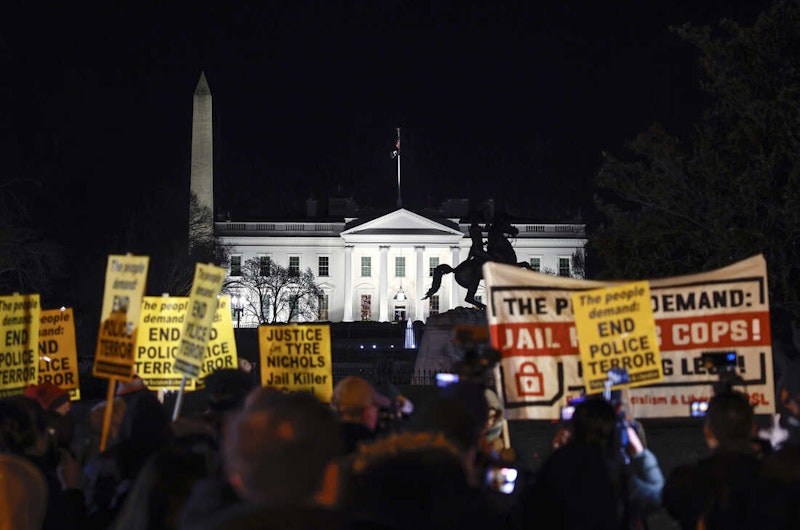Here’s some black history: I said during the Ferguson riots nine years ago that it was unfortunate the U.S. keeps shoehorning police brutality cases into a racial narrative. Pretending the cases are all about race impairs people’s ability to talk about broader problems, such as government recklessness and the criminal use of force in general. Now, with the death of Tyre Nichols—a black man killed by five black police officers—you can sense the establishment’s frustration at not being easily able to call it a case of white supremacy, though some still try.
The most evil, cynical, self-serving elements of our civilization—government, media, and the arrogant professoriate with its shrinking classes on “intersectional” analysis—have every reason to keep the populace divided while pretending they are above it all and fit to manage all the conflicts they stoke.
I recall the willfully absurd columnist Amanda Marcotte condemning Sen. Rand Paul of all people—nearly the only politician in America to make a conservative case for shrinking police power and government in general in order to reduce Ferguson-style clashes between cops and citizenry—because Marcotte reasoned that Paul’s defense of gun ownership and other private alternatives to corrupt government police was somehow increasing the ambient level of violence in society. Blur your vision enough and you can see any excuse for increased government power you might desire, in any set of data.
A black commenter on Twitter a couple years ago was closer to the truth when he responded to Disney’s growing interest in doing cartoons and songs urging slavery reparations (paid for by the general population, guilty or not) by suggesting conflict-stoking Disney instead pay reparations to all the cultures it has mined for source material while opening its archives to provide easier access to its past pieces using blackface, thereby fostering public discussion.
In other words, who are these establishment jerks, whether universities, leftist pundits, or government agencies, to dictate the terms on which the rest of society will seek justice and peaceful coexistence?
Were it not for the Nichols controversy, the media would probably all be swarming over the news that police recently launched a new investigation of Kanye for grabbing the cell phone/camera of an annoying paparazzo, turning the incident around in their minds until they could figure out just the right angle for slamming conservatives hidden somewhere in the meaningless clash: capitalist celebrity entitlement? Legitimate black fear of surveillance? Patriarchal violence? Gotta be something that will get people fighting each other.
On the other hand, maybe the “benign neglect” Sen. Patrick Moynihan longed for on race topics decades ago is the path of least resistance: I notice a liberal reporter acquaintance saying that faced with the horrific Nichols case, he’s suddenly lost interest in watching crime footage, too exhausted by it all—convenient timing, since there are no white cops to condemn, but regardless, I’d welcome the calm and silence as a change of pace. Meanwhile, I notice one liberal Twitter user proclaims there’s no deeper social lesson in the Nichols case because it’s just a tragic, isolated incident. I suppose they’re all tragic, isolated, meaningless incidents except when they fit into the establishment liberal narrative.
You won’t, for instance, find any mainstream pundits seizing on the Nichols case as an opportunity to remind the public that the black crime rate is higher than the general population’s crime rate. You certainly won’t find them trying to find a novel tack on it all by reporting that black cops have the highest rates of committing brutality and other violations. Fine by me—but remember this quiet lull the next time the establishment has a case it likes, with evil white cops the way they like it, and hear in the ensuing din the sound of an establishment picking and choosing when to find meaning in events, when to notice violence, when to reawaken an intermittent, selective interest in the consequences of government force.
They don’t want you to think about government per se at all. That might call to mind solutions, or at least policy changes beneficial to us all. Better to wait until some unresolvable tribal tensions reappear before shining a spotlight, thinks the establishment.
And I don’t mean to suggest that only the liberal establishment is to blame. Much as I might wish conservatives would seize the opportunity to prove the sincerity of their limited-government ideals by calling for less policing or even the abolition of all government police through privatization (markets can handle security, just as they do bread-baking and electronics-selling), I’ve seen the New York Post crowd deride peaceful street parties and Manhattan Institute staff members long for increased pot arrests enough times to know that a world with less tear gas, fewer billy clubs, and more freedom isn’t what any major political faction really wants, not enough to do anything rational about it.
—Todd Seavey is the author of Libertarianism for Beginners and is on Twitter at @ToddSeavey

